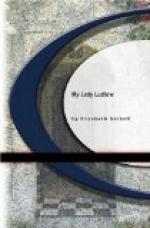“And did he finish it?” I asked.
“O yes, my dear. What my grandfather said was to be done, was done always. He was a terrible man in his anger! But to think of the difference between Parson Hemming and Mr. Gray! or even of poor dear Mr. Mountford and Mr. Gray. Mr. Mountford would never have withstood me as Mr. Gray did!”
“And your ladyship really thinks that it would not be right to have a Sunday-school?” I asked, feeling very timid as I put time question.
“Certainly not. As I told Mr. Gray. I consider a knowledge of the Creed, and of the Lord’s Prayer, as essential to salvation; and that any child may have, whose parents bring it regularly to church. Then there are the Ten Commandments, which teach simple duties in the plainest language. Of course, if a lad is taught to read and write (as that unfortunate boy has been who was here this morning) his duties become complicated, and his temptations much greater, while, at the same time, he has no hereditary principles and honourable training to serve as safeguards. I might take up my old simile of the race-horse and cart-horse. I am distressed,” continued she, with a break in her ideas, “about that boy. The whole thing reminds me so much of a story of what happened to a friend of mine—Clement de Crequy. Did I ever tell you about him?”
“No, your ladyship,” I replied.
“Poor Clement! More than twenty years ago, Lord Ludlow and I spent a winter in Paris. He had many friends there; perhaps not very good or very wise men, but he was so kind that he liked every one, and every one liked him. We had an apartment, as they call it there, in the Rue de Lille; we had the first-floor of a grand hotel, with the basement for our servants. On the floor above us the




